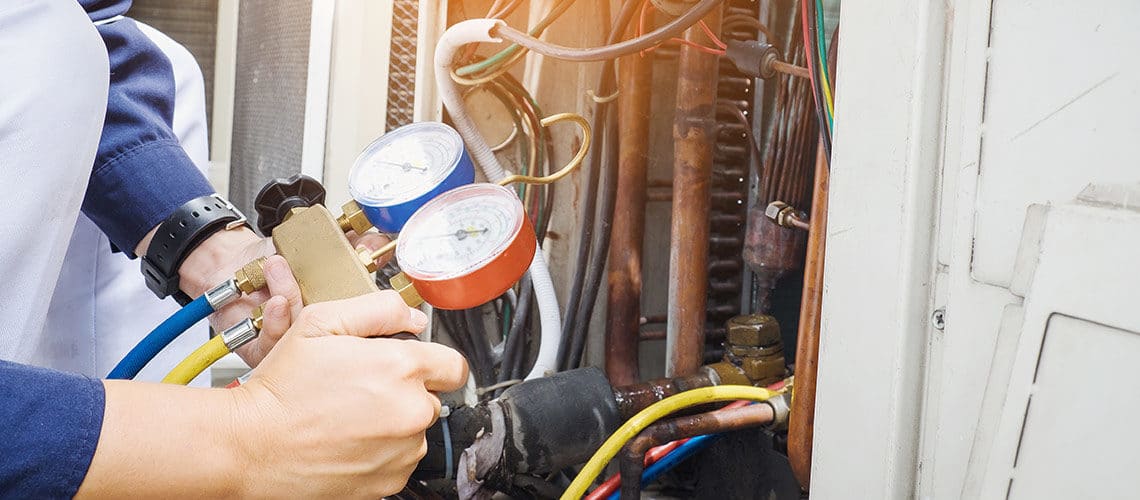Energy-Efficient Systems Installed by DMAKS HVAC Specialists.
Energy-Efficient Systems Installed by DMAKS HVAC Specialists.
Blog Article
Just How to Select the Right Heating And Cooling System for Your Demands
Choosing the ideal A/c system is a critical choice that needs cautious consideration of numerous variables. The myriad of system types readily available can complicate this procedure, leading one to ask yourself which path ultimately leads to optimum convenience and performance.
Evaluate Your Home Dimension
Analyzing your home size is an important initial step in picking the suitable A/c system. A HVAC system that is too tiny will certainly struggle to maintain comfortable temperature levels, leading to raised power intake and use on the system.
To properly examine your home dimension, measure the square video footage of each room, taking into consideration factors such as ceiling elevation and the design. Furthermore, think about the insulation quality and the variety of windows, as these aspects impact thermal performance. Residences with open floor plans might require various system setups compared to those with many divided areas.
Making Use Of the Guidebook J lots calculation technique can give a much more accurate quote of your a/c requires. This method make up various elements, consisting of local climate, solar gain, and occupancy patterns. By very carefully reviewing these elements, you can guarantee that your chosen HVAC system is suitably sized, resulting in improved comfort, energy performance, and durability of the equipment.
Determine Your Budget Plan
Identifying your budget is a critical action in the heating and cooling system option procedure, as it sets the specifications for your choices - DMAKS HVAC. A HVAC system is a significant investment, and recognizing your financial limits will assist narrow down options that fit within your methods
Begin by examining not only the initial acquisition cost but additionally installment prices, which can differ significantly relying on the intricacy of the task. Take into consideration ongoing expenditures such as upkeep, fixings, and energy usage. A system may show up budget-friendly originally however can bring about higher expenses with time if it is much less efficient.
It is advisable to allot a contingency fund for unanticipated costs that may emerge during installment or preliminary system adjustments (DMAKS HVAC). In addition, check out financing choices or discounts that might be readily available, as these can alleviate the problem of ahead of time expenses
Inevitably, having a clear budget plan permits you to engage with HVAC specialists much more properly, guaranteeing you get tailored recommendations that straightens with your financial objectives and home needs. By being thorough regarding your budget plan, you can make informed choices that improve comfort without endangering economic security.
Evaluate Power Efficiency
Energy performance plays an essential duty in the overall efficiency and cost-effectiveness of your HVAC system. Look for systems with a high Seasonal Power Effectiveness Proportion (SEER) for cooling down and a high Annual Fuel Utilization Effectiveness (AFUE) rating for home heating.
Furthermore, think about the Power Star qualification, which indicates that the system fulfills rigid efficiency guidelines set by the Epa. Purchasing an Energy Star-rated HVAC system can lead to substantial financial savings over time, specifically in areas with severe temperature level variations.
An additional factor to evaluate is the system's size and capacity. An oversized or official source undersized system can lead to ineffectiveness and boosted energy prices. DMAKS HVAC. Proper sizing, often determined through a Manual J tons estimation, ensures that the system operates at optimum effectiveness


Consider Climate and Atmosphere
When choosing a cooling and heating system, it is crucial to think about the regional climate and environmental conditions, as these aspects substantially affect the system's efficiency and effectiveness. Different regions experience differing temperature level extremes, moisture levels, and seasonal changes, all of which effect heating and cooling needs.

Moreover, regional ecological elements, such as air top quality and potential allergens, must notify your option. Systems geared up with innovative filtering modern technologies can help alleviate toxins and give cleaner air. Furthermore, take into consideration the energy sources offered in your location-- some HVAC systems look at here are much more effective when powered by gas or renewable resource sources.
Ultimately, aligning your a/c system option with your local climate and environmental considerations will result in improved convenience, boosted performance, and reduced power prices.
Explore System Types and Features
As home owners seek to enhance convenience and performance, discovering the numerous kinds of HVAC systems and their distinct features becomes vital. The key sorts of cooling and heating systems consist of central air, heatpump, ductless mini-split systems, and heaters. Each system offers distinctive benefits customized to various requirements and preferences.
Central air conditioning their explanation systems offer uniform cooling throughout a home, making them optimal for larger spaces. Heat pumps work as both home heating and cooling services, using electrical power to transfer heat, which can result in reduced power expenses. Ductless mini-split systems are ending up being progressively popular due to their flexibility and ease of installment, permitting home owners to manage the temperature in specific spaces without substantial ductwork.

Verdict
In conclusion, picking the ideal cooling and heating system necessitates careful consideration of different aspects, consisting of home dimension, spending plan restraints, power performance, local environment, and available system types. A thorough assessment of these elements ensures optimal convenience and cost-effectiveness. By adhering to an organized approach, home owners can make enlightened choices that straighten with their certain requirements and preferences, eventually resulting in enhanced interior air quality and energy financial savings.
Report this page